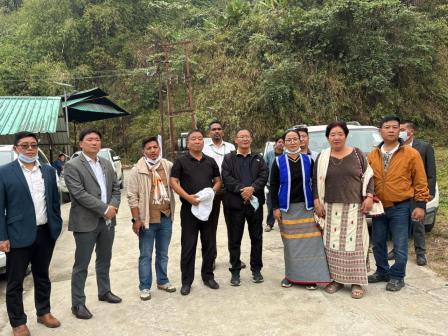-
COPU reviews state PSUs in second sitting
-
CM stresses on strong internal security, tech-driven policing
-
Cabinet approves proposals aimed at strengthening governance, enhancing public…
-
Body found hanging at bus stop with limbs tied sparks…
-
Mein chairs pre-budget consultative meeting with community based organisations
-
District level training on Census of India 2027 begins at…
-
WCD Minister reiterates commitment to safeguarding rights, dignity of…
-
Woman loses life in massive fire, two children seriously injured
-
 UA Minister inspects burial ground, focuses on maintenance and improvement
UA Minister inspects burial ground, focuses on maintenance and improvement
-
 UA Minister inspects burial ground, focuses on maintenance and improvement
UA Minister inspects burial ground, focuses on maintenance and improvement
Its vast ice sheets and monsoon run-off makes the Tibetan plateau one of the largest sources of fresh water on an increasingly thirsty planet. It supplies 1.3 billion people with water for irrigation and drinking, and offers the promise of unparalleled hydropower. As China looks to claim the vast flows that emerge from the water tower of Asia, what of the rights of its downstream neighbours?
China has plans to dam or divert each of the five great rivers that emerge from Tibet’s high plateau before tumbling into neighbouring countries – the Indus, Brahmaputra, Irrawaddy, Salween and Mekong. These projects have sparked simmering disputes between China and its neighbours.
Water warfare as predicted long before, is clearly on display with China having the vantage point of many of the rivers in South East Asia originating from the Tibetan plateau has used it as a political tool and as leverage on a downstream country –India. China has denied India flood-related hydrological data since May, even as major flooding has hit the region from Assam to Uttar Pradesh. Data on upstream river flows is essential for flood forecasting and warning in order to save lives and reduce material losses.
China’s latest action actually violates two bilateral MOUs of 2013 and a 2014 accord, which obligate it to transfer hydrological data to India from three upstream monitoring stations in Tibet every year from May 15 to October 15. No data has been transferred thus far this year, although India, in keeping with the MOUs, paid for the data in advance. While China sells hydrological data to downriver countries, India provides such data free to both its downstream neighbours — Pakistan and Bangladesh.
For long, China has been damming its many rivers as a way of flexing its muscles with co-riparian India. The flash floods that ravaged Himachal Pradesh and Arunachal Pradesh between 2000 and 2005 were linked to the unannounced releases from rain-swollen Chinese dams and barrages.
The issues of downstream communities must be treated from a humanitarian perspective as in many cases this has resulted in greater frequency and severity of flooding, drought and pollution. International cooperation on shared water resources is critical and must be strengthened and adhered to at all costs.

Kenter Joya Riba
(Managing Editor)She is a graduate in Science with post graduation in Sociology from University of Pune. She has been in the media industry for nearly a decade. Before turning to print business, she has been associated with radio and television.
Email: kenterjoyaz@easternsentinel.in / editoreasternsentinel@gmail.com
Phone: 0360-2212313

